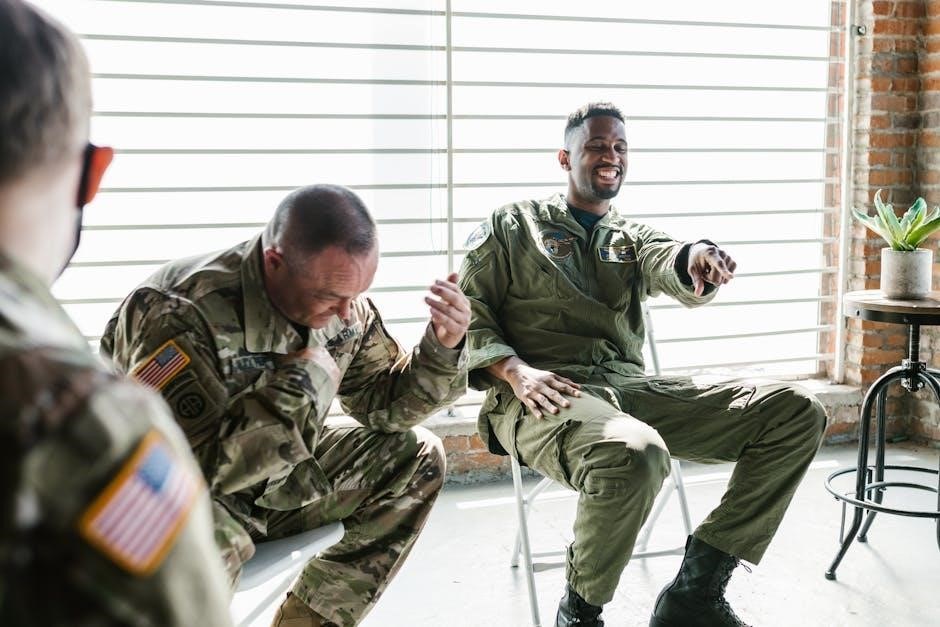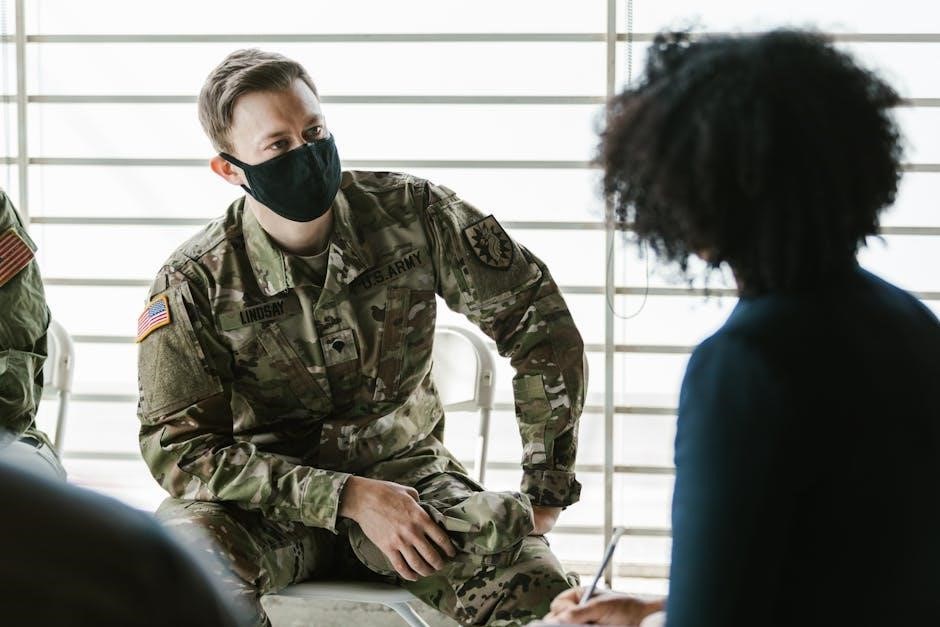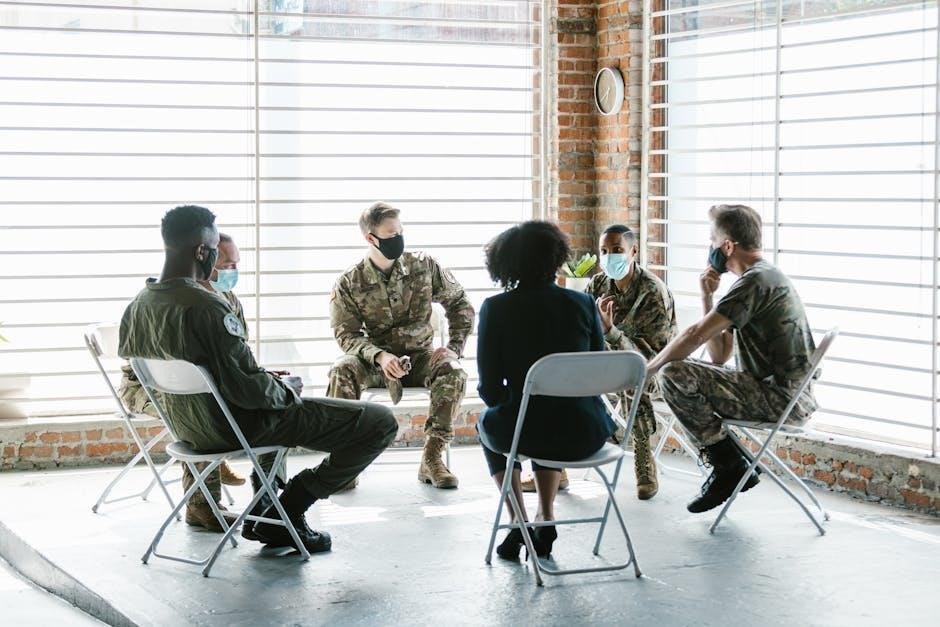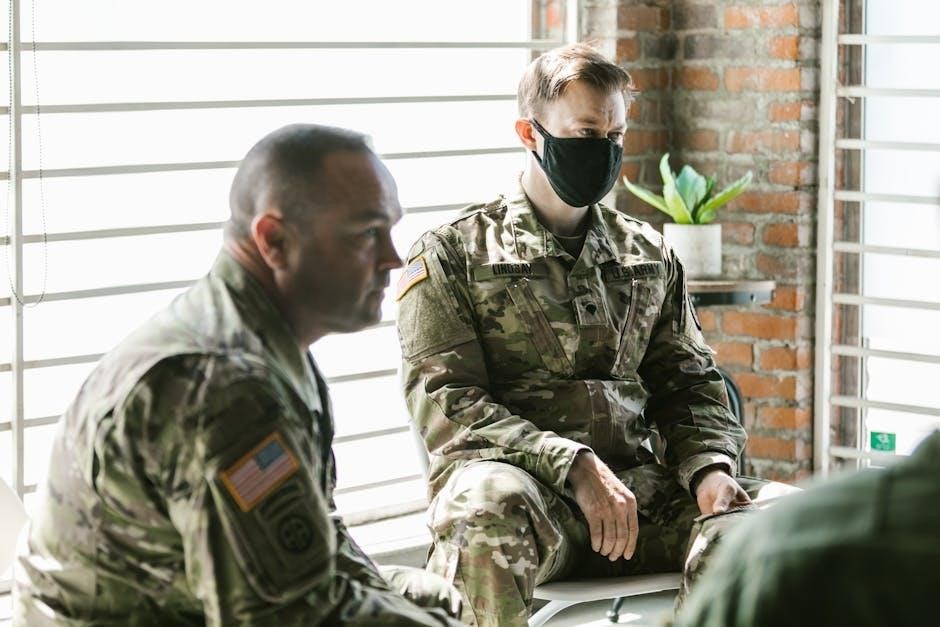
Navy counseling chits are essential tools for documenting performance feedback and corrective actions, ensuring accountability and fostering personal and professional development within the naval community․
Overview of Counseling Chits in the Navy
Counseling chits are standardized tools used by the Navy to document counseling sessions between service members and their superiors․ They serve as formal records of performance feedback, corrective actions, and personal development discussions․ Counseling chits are essential for maintaining accountability and ensuring that both positive and negative behaviors are addressed․ They can be used for formal or informal counseling, providing a structured format to guide conversations and track progress․ While historically significant, modern practices have evolved, with tools like Page 13 now being used for formal counseling cases․ These documents play a critical role in fostering growth and adherence to naval standards, ensuring clear communication and consistent expectations across all ranks․
Historical Context and Evolution
Counseling chits have historically served as vital tools for documenting performance and behavior in the Navy, providing a structured method for addressing both positive and negative actions․ Originally designed to ensure accountability and transparency, these chits have undergone significant changes over the years․ While they were once the primary means of formal counseling, modern practices have shifted toward using Page 13 for formal cases, streamlining the process․ The evolution reflects the Navy’s commitment to adapting to changing needs, ensuring effective communication and consistent documentation․ This transition highlights the importance of maintaining accurate records while fostering personal and professional growth within the naval community․
Types of Counseling in the Navy
Counseling in the Navy includes both formal and informal methods, designed to address performance, behavior, and personal development․ Formal counseling is documented, while informal is verbal or written guidance․
Formal vs․ Informal Counseling
Formal counseling in the Navy is structured and documented, often using official forms like Page 13, to address significant performance or behavioral issues․ It is typically used for corrective actions, ensuring accountability and providing a clear record for future reference․ On the other hand, informal counseling is more casual, often conducted verbally or via email, and is used for minor issues or routine feedback․ While informal counseling is not formally documented, it is still an essential tool for fostering growth and maintaining standards․ Both methods play a crucial role in the Navy’s approach to personnel development and discipline, ensuring sailors receive appropriate guidance and support․
Common Counseling Scenarios
Common counseling scenarios in the Navy often involve addressing performance issues, such as subpar duty performance or misconduct․ Counseling may also be used for behavioral corrections, like unprofessional behavior or failure to follow regulations․ Additionally, it is employed for proactive guidance, such as career development or personal goal setting․ Specific examples include counseling for failure to shave, loss of a Common Access Card (CAC), or neglect of duties․ These scenarios are typically documented using formal tools like Page 13 or informal methods, depending on the severity․ Effective counseling ensures sailors understand expectations and are given opportunities to improve, maintaining readiness and accountability within the naval community․

Documentation and Process
Navy counseling chits have been replaced by Page 13 documents, which outline the process for documenting counseling sessions, ensuring accountability and clear communication throughout the naval community;
How to Fill Out a Counseling Chit
Filling out a counseling chit involves detailing the service member’s name, date, and the specific period being reported․ Clearly describe the issue, expectations, and corrective actions agreed upon․ Ensure accuracy and fairness in documenting the counseling session, as this serves as an official record for performance evaluation and future reference․ Properly completed chits are essential for maintaining accountability and supporting the development of naval personnel․ The process emphasizes clear communication and formal documentation to address performance or behavioral concerns effectively․

The Role of Page 13 in Modern Counseling Practices
Page 13 has replaced traditional counseling chits as the primary tool for documenting formal counseling sessions in the Navy․ It serves as a standardized format for recording performance feedback, corrective actions, and developmental goals․ This document is part of the enlisted service record and is used to address both positive achievements and areas needing improvement․ Page 13 ensures consistency and clarity in counseling, providing a formal record that can be referenced for promotions, evaluations, and administrative actions․ Its structured format helps ensure fairness and accountability, making it a critical component of modern Navy counseling practices and personnel management․

Legal and Administrative Aspects
Counseling chits are formal documents requiring legal compliance, often linked to Article 15 actions and corrective measures․ Proper documentation ensures accountability and adherence to naval administrative protocols․
Understanding Article 15 and Counseling Statements
Article 15 of the Uniform Code of Military Justice (UCMJ) governs non-judicial punishment, often tied to counseling statements․ These statements document corrective actions for misconduct, serving as formal notifications of performance issues․ They outline specific violations, corrective measures, and expectations for improvement․ Counseling statements are typically used in conjunction with Article 15 actions, providing a legal framework for addressing disciplinary matters․ Proper documentation ensures accountability and fairness, while also safeguarding service members’ rights․ Understanding this process is crucial for both sailors and commanders to navigate the legal and administrative aspects of naval discipline effectively․

Training and Best Practices
Navy training emphasizes effective communication, empathy, and active listening in counseling․ Best practices include tailoring sessions to individual needs and maintaining professionalism to foster trust and growth․
Effective Communication in Counseling Sessions
Effective communication is the cornerstone of successful Navy counseling sessions․ It involves active listening, clarity, and empathy to ensure understanding․ Counselors must adapt their approach to the individual’s needs, fostering a supportive environment․ This ensures that feedback is constructive and actionable, promoting personal and professional growth․ Proper documentation of these interactions, often through counseling chits or Page 13 entries, is crucial for tracking progress and accountability․ Training programs emphasize these skills to enhance the effectiveness of counseling and maintain high standards of leadership and mentorship within the naval community․ Clear communication helps build trust and ensures that goals are met efficiently․
Case Studies and Real-World Applications
Real-life examples, such as negative counseling for sleeping on duty, highlight practical applications of counseling chits in addressing misconduct and fostering improvement, showcasing their effectiveness in Navy operations․
Examples of Successful Counseling Outcomes
Successful counseling outcomes in the Navy often result in improved performance, behavior, and overall readiness․ For instance, a sailor who received counseling for tardiness implemented time management strategies, achieving consistent punctuality․ Another example involves a service member who, after negative counseling for unprofessional behavior, demonstrated marked improvement in interpersonal interactions․ These outcomes highlight the effectiveness of structured counseling processes, including the use of Page 13 documentation, in fostering personal and professional growth․ Such successes underscore the importance of counseling as a tool for addressing issues and enhancing mission readiness within the Naval community․
Navy counseling chits remain vital for documenting feedback, addressing performance issues, and fostering growth, ensuring sailors meet high standards and maintain operational readiness across all commands․
The Importance of Counseling in Navy Operations
Counseling is a cornerstone of Navy operations, fostering accountability and operational readiness․ It ensures sailors meet high standards, addressing both commendable performance and corrective actions․ The shift from traditional chits to Page 13 and other documentation methods reflects modern practices, emphasizing clarity and consistency․ Effective counseling enhances communication, resolves issues promptly, and supports mission success․ By addressing individual needs and promoting personal growth, it strengthens unit cohesion and morale․ Leaders prioritize counseling to maintain discipline and readiness, ensuring the Navy remains a disciplined and effective force․ Counseling is not just a tool for correction but a vital mechanism for fostering a culture of excellence and accountability․